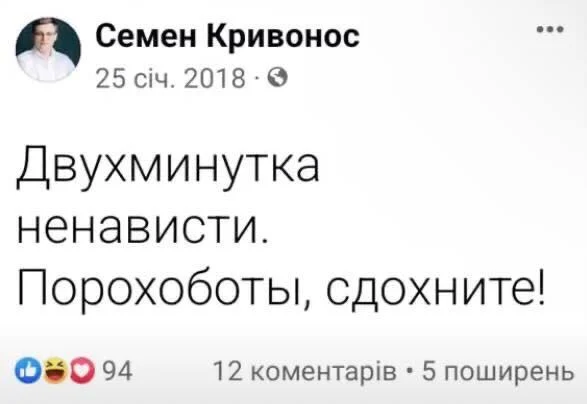On March 6, the Cabinet of Ministers ‘in turbo mode’ appointed the head of the State Inspectorate of Architecture Semen Kryvonos as the new director of the National Anti-Corruption Bureau. Of the available 15 days to choose from the three finalists of the competition, two days were enough for the government. It could seem a victory because the anti-corruption system of Ukraine is finally formed. However, the newly appointed director of the NABU immediately became involved in a scandal that could have far-reaching negative consequences for all of us.
If we try to describe the history of the creation and activity of the the NABU, the Special Anti-Corruption Prosecutor’s office (SAP), and the Supreme Anti-Corruption Court in one word, the best word would be ‘scandal’. There is nothing extraordinary in this, since few people are aware of and directly interested in the existence and effectiveness of anti-corruption law enforcement agencies. For the authorities, other law enforcement agencies and courts, formally, it is a supervisor. For the majority of the society, they are people who receive huge salaries ‘for unknown reasons’, because corruption in the country ‘lives and thrives and makes good money’.
At the same time, recently anti-corruption bodies managed to get into a scandal even in the area where they had support before. By intensifying the case against the person who occupies the undisputed first place in the rating of ‘what they receive money for’ – the ex-chair of Naftogaz Andrii Kobolev, the NABU and SAP may temporarily win a few points among the broad masses of the people, but they will lose much more among the active part of the society. After all, the actions of the NABU and SAP are illogical from the point of view of their role as part of the state, and not ‘things in themselves’. In addition, by seeking the conviction of effective managers under a formal pretext (extremely dubious), the NABU and SAP are destroying corporate reform, thereby increasing, not reducing, the amount of corruption in the state, and at the same time they are undermining the basis of their existence (more on that later).
Theoretically, the anti-corruption infrastructure is quite satisfied with this situation – the more corruption there is, the more opportunities there are to demonstrate the fight against it, to declare loud suspicions, wanted ads, photos of unfolded banknotes, and so on, periodically seasoning it all with some kind of a court verdict. It should be understood that the goal of any law enforcement agency is the fulfillment of pre-approved indicators of work efficiency, and not the absence, and even more so, the impossibility of the existence of crime (in our case, systemic corruption), which is the goal of the civil society. However, in practice, everything looks a little different.
The scandal with the election of the director of the NABU has every chance to win the top prize both for the speed of the outbreak (the newly appointed head got into his first scandal earlier than in his office), and because of the absolute senselessness of the act of the official himself. In the public domain on his Facebook page, he wished for the death of a part of Ukrainians (not to mention the publication itself and even thoughts about such a thing). Moreover, it is not only about the inability of the head of the investigative body, who will be opposed by the country’s best lawyers, to think at least half a step ahead, but also about the fact that in the past years, only Russians wished Ukrainians death. It turned out that the director of the National Anti-Corruption Bureau of Ukraine also has the same wish.
It can be expected that the consequence of this will be the accusation of the NABU of political involvement in each case. The new director of the NABU is already accused of having connections with the head of the President’s office Andrii Yermak, and these accusations have just been reinforced in the form of open hate against the current opposition, with which the current government continues to fight with almost maniacal stubbornness. It is easy to understand how Ukraine’s partners will look at this show. Actually, they have already expressed their attitude to it.
If the newly appointed director of the NABU does not want to get the reputation of ‘Yermak’s man’ and a politically biased executor of the President’s office tasks, he will have to prove his independence in practice – that is, to come into conflict with the the Presidents office and its almost unlimited powers (because the current Verkhovna Rada and the Cabinet of Ministers have actually turned into the President’s office departments) and resources, both media and financial. The civil society and the support of Western partners could help the NABU in this confrontation. However, the credit of both is limited, and each subsequent ‘tranche’ will have to be obtained through effective work – not by demonstrative processes against investigators of state bodies and companies, but by investigating actual cases.
From a certain point of view, such weakness of anti-corruption bodies is beneficial to the authorities. After all, the government is interested in remaining in power, and for this they need money for the elections (which will have to be held sooner or later), even taking into account the growth of the president’s rating due to his actions at the beginning of the full-scale invasion of the Russian Federation. Moreover, even without elections, the number and scale of corruption scandals over the past year only increased.
Anti-corruption bodies, by their very nature, must be antagonistic to every government and be in constant conflict with it. That is why the authorities are completely satisfied with the director of the NABU, who was discredited even at the stage of appointment (and we should not forget that a similar thing was planned with the competition for the post of the head of the SAP – when it turned out that the ‘wrong person’ was winning, the members of the commission began to delay the completion of the procedure with all their might). The newly appointed head of the Bureau himself apparently has no idea that his new position is actually a huge target on his back. One of the first signs of this is the post of Mikheil Saakashvili’s press secretary, who publicly said that Semen Kryvonos was not a member of Saakashvili team and accused him of corruption.
An attempt to establish and maintain good relations with the authorities can have negative consequences both for the NABU (loss of the status of an independent body and support as such) and for the authorities (usurpation of the anti-corruption structure is unlikely to have a positive effect on relations with the West).
The latter is the worst of the possible options for Ukraine, because the deterioration of relations with the West will certainly affect the amount of Western aid, the situation with which is already deteriorating. Certainly, the thesis ‘we will support Ukraine as long as necessary’ will not dissapear. However, how big this support will be is a question.
So far, the successes of the Armed Forces and the resilience of the Ukrainians have given the Ukrainian authorities the opportunity to bargain for aircraft and long-range missiles. However, such childish attempts to bluff in an adult game, as with the appointment of the director of the NABU, can bring the Ukrainian authorities down from heaven to earth – to bidding for the provision of at least already agreed aid and at least armored personnel carriers instead of airplanes. This means that the defense of the Ukrainian territories, not to mention the offensive, will have to be paid for with the blood of Ukrainian infantry, and not with Western equipment and ammunition. In conditions when the mobilization resource of Ukraine is several times smaller than that of Russia, this equation comes down to a very sad result.
This result is so sad that people who have been telling for so long that ‘Poroshenko’s Minsk agreement is treason’ may need to convince Ukrainians that ‘Zelensky’s Minsk is a victory” and urge them ‘not to look up’ at the map of the occupied territories. In this case, everyone loses. Except for Russia.

 Creative director of ROA Patrick Stengbye talking about the shoes he chooses for running, what the brand will surprise us with in 2024 and President Zelensky’s style
Creative director of ROA Patrick Stengbye talking about the shoes he chooses for running, what the brand will surprise us with in 2024 and President Zelensky’s style 






